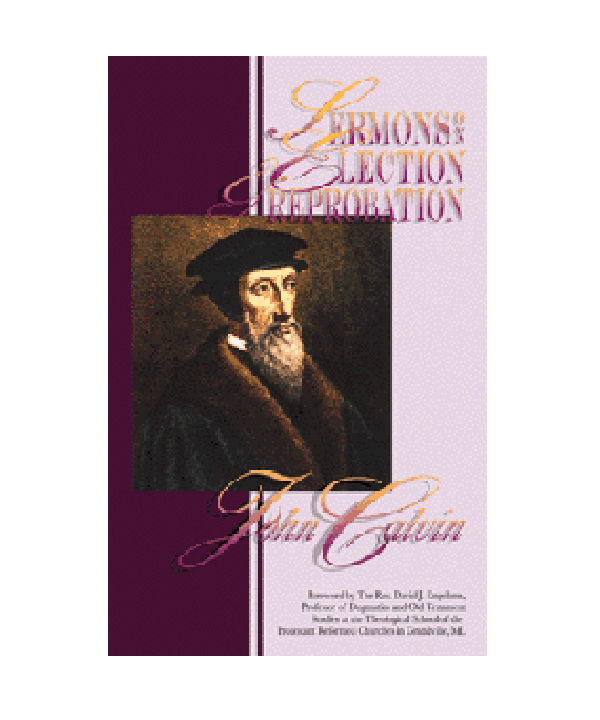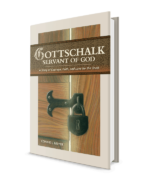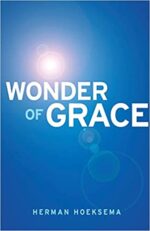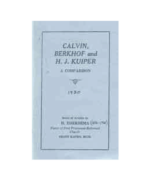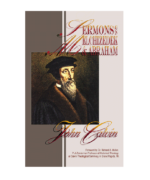Calvin’s preaching was intensely practical. From the outset of a sermon, Calvin was applying the teaching of the passage to the experience and life of the congregation.” “Practical as Calvin was in preaching the Old Testament, he did not view Old Testament history as a mere collection of illustrations for a godly life. For Calvin, Old Testament history has a covenantal centre and is, therefore, prophetic of Jesus Christ. Commenting on Rebekah’s attempt to gain the blessing for Jacob by ‘craft and lying,’ Calvin said, ‘The matter was here of the salvation of the world, the question was of having Jesus Christ whom God should send for a Redeemer’”
The sermons therefore are doctrinal. Nor is predestination the only doctrine taught. Indeed, the title of the set of sermons can be misleading. Sermons six through nine contain little or nothing that explicitly concerns predestination, treating as they do of the trial of Isaac in Gerar. Only at the end of sermon ten, where he explains Esau’s marriages to two heathens as a manifestation of his reprobation, does Calvin return to the subject of predestination.
Running through the entire exposition, as through all of Calvin’s theology, is the theme that binds all together, the sovereignty of the God and Father of Jesus Christ. This sovereignty is divine purpose and power governing all that takes place, the disobedience of the reprobate as well as the obedience of the elect, for the sake of God’s glory in the salvation of the church of Jesus Christ…. Following the apostle in Romans 9, John Calvin saw in the inspired history of Jacob and Esau the revelation of God’s eternal predestination of some particular individuals unto salvation, and of other particular individuals unto damnation.
Sermons on Election & Reprobation by John Calvin. Audubon, New Jersey: Old Paths Publications, 1996. 317 pp., plus subject and scriptural text indexes (hardcover). [Reviewed by David J. Engelsma]
These sermons by John Calvin on God’s election of Jacob and reprobation of Esau were published in English for the first time in 1579. Never again reprinted until now, they have been unavailable to, and virtually unknown by, English-speaking people for more than 400 years. They were originally part of Calvin’s series on the book of Genesis. Calvin began the series in September, 1559. The sermons represent, therefore, the reformer’s well-developed exegetical abilities and mature theological position. It should be remembered that the sermons on Genesis are different from Calvin’s earlier commentary on Genesis.
The sermons that make up the content of this book cover Genesis 25:12 – 27:38.
With this reprint, Old Paths Publications makes a very valuable work of Calvin available in English for the first time in more than 400 years. Preachers and other scholars will want to study it for its contribution to the knowledge both of Calvin’s method of preaching and of Calvin’s doctrine of predestination.
But the book will also be welcomed by the ordinary church member, especially the Reformed and Presbyterian church member. Calvin preached to the people of God. He used language that they would understand and that would bring the Word home to them. In the sermon on Genesis 27:31-38, Calvin explains that “Esau cried out, yea by yelling and roaring, and that he howled as it were a wild beast.”
The publisher has made the book reader-friendly. This reprint is not a mere photolithographed facsimile of the original 1579 edition; as is often the case, with the reprinting of Calvin’s sermons. The text has been newly typeset, so that the forms of letters and the spelling are modern. Also, archaic words are immediately explained in brackets by their contemporary equivalent. For example: “… to wit, these Dotards (foolish talkers, imbeciles)” (p. 202).
Nevertheless, the original work was left complete and unabridged. We have in this volume the sermons preached by Calvin in Geneva as the notable scribe, Denis Raguenier, took them down and as the English translator, John Field, rendered the original French into English.
The content is rich: God’s sovereignty in the predestination of men, not as an abstract treatise but in the form of faithful exposition of Old Testament Scripture. Commenting in the second sermon on God’s deliberate government of the birth of the twins so that Esau was born first and Jacob, second, Calvin explained:
And why doth God then pull him (Jacob) back, and make him inferior to his brother, as touching the law of nature, and afterwards setteth him (Jacob) above him (Esau)? In this we see that God would shut out all glory of man, that he would that all height should be thrown down, and that men should bring nothing of their own: to the end to say: I have attained such or such a good thing. I have gotten it by mine own industry. We see then that which I have already touched: that is to say, that we have here a glass, wherein we may behold, that all they that are of the church, are not advanced thereto by their own virtue, and that they have not obtained this favor by their merits: but that God hath chosen them before they were born (pp. 31, 32)
Not only do the sermons make clear what predestination is for Calvin, but also the importance of the doctrine for the Christian faith. Predestination is an eternal, sovereign decree that determines the everlasting destiny of every human. It is a decree that distinguishes between the natural children of believing parents.
The significance of election is that it is the source of every Christian virtue, the ground of the assurance of salvation, and the truth that attributes “the whole praise of our salvation to … him (God).”
Calvin was not the slick, smiling, positive preacher who is the curse of much of contemporary evangelicalism, indeed, of much of nominally Reformed Christianity. His preaching pointed out and condemned the errors opposed to predestination. The enemies could be distinguished as “dogs” and “hogs.” The dogs were the theologians who spoke and wrote against predestination. The hogs were those who professed to believe the doctrine, claiming to be elect, but whose unholy lives brought shame upon the truth that they professed.
Regarding those who opposed predestination by teaching that election depends upon foreseen faith, Calvin declared that they “have no drop of the fear of God.”
Predestination is by no means the only doctrine treated in the book. The chapters in Genesis covered by these sermons contain many doctrines, including instruction for the Christian life. Calvin found them all. The tenth sermon, on Isaac’s dealings with Abimelech, is a powerful exhortation to the Christian to purify himself “of all bitterness, hatred, and rancour, of all desire to revenge.”
Adding to the value of an already invaluable work – Calvin! Calvin’s sermons! Calvin’s sermons on predestination! – is an intriguing “appendix”: “An Answer to certain slanders and blasphemies, wherewith certain evil disposed persons have gone about to bring the doctrine of God’s everlasting Predestination into hatred.”
This is a little-known, succinct defense of predestination by Calvin himself against certain attacks on the doctrine, evidently about the time that Calvin was preaching on the doctrine out of Genesis.
From this “Answer” it is apparent that not only were the arguments against the doctrine of predestination the very same as those still raised today, but also they were the very same as the arguments being raised today in defense of the “well-meant offer.” In Calvin’s day, “Sebastian Chastalio or some such like” argued against predestination, that God “laboreth to draw unto him all that went astray”; that Ezekiel 18:32 33:11 teach that God desires to save all; that “God hath not created nor predestinated any man not to ‘believe, seeing he calleth everyone”; and that Jesus’ call to the heavy laden in Matthew 11:28 proves that “grace is given equally to all.”
In our day, the Christian .Reformed Church; John Murray and Ned Stonehouse; Iain Murray and the Banner of Truth; and others who profess Calvinism, adopt exactly the same arguments in their attack upon sovereign, particular grace in the preaching of the gospel, according to predestination.
Now the entire English-speaking world can read Calvin’s rejection and refutation of these perennial arguments against divine predestination.
The book includes a foreword of some length by the editor of the Standard Bearer.
There is also an index of texts and an index of topics.
Not to be overlooked is that the book is a handsome, gold-on-burgundy, hardcover volume. The publisher has done it right.
“I’ve begun to read Sermons on Election and Reprobation by Calvin. His sermons are very clear, and are a blessing to me as I learn more about predestination, election and reprobation. Calvin was a great Reformer, pastor, preacher, lecturer and writer.” – Lincolnshire, England

